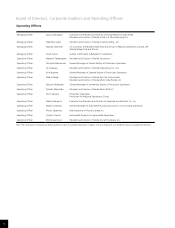Honda 2010 Annual Report Download - page 33
Download and view the complete annual report
Please find page 33 of the 2010 Honda annual report below. You can navigate through the pages in the report by either clicking on the pages listed below, or by using the keyword search tool below to find specific information within the annual report.
1. Honda’s operations are subject to currency fluctuations
Honda has manufacturing operations throughout the world, including Ja-
pan, and exports products and components to various countries. Honda
purchases materials and sells its products in foreign currencies. Therefore,
currency fluctuations may affect Honda’s pricing of products sold and ma-
terials purchased. Accordingly, currency fluctuations have an effect on
Honda’s results of operations and financial condition, as well as Honda’s
competitiveness, which will over time affect its results. Since Honda ex-
ports many products and components from Japan and generates a sub-
stantial portion of its revenues in currencies other than the Japanese yen,
Honda’s results of operations would be adversely affected by an apprecia-
tion of the Japanese yen against other currencies, in particular the U.S.
dollar.
2. Honda’s hedging of currency and interest rate risk
exposes Honda to other risks
Although it is impossible to hedge against all currency or interest rate risk,
Honda uses derivative financial instruments in order to reduce the sub-
stantial effects of currency fluctuations and interest rate exposure on our
cash flow and financial condition. These instruments include foreign cur-
rency forward contracts, currency swap agreements and currency option
contracts, as well as interest rate swap agreements. Honda has entered
into, and expects to continue to enter into, such hedging arrangements.
As with all hedging instruments, there are risks associated with the use of
such instruments. While limiting to some degree our risk fluctuations in
currency exchange and interest rates by utilizing such hedging instru-
ments, Honda potentially forgoes benefits that might result from other
fluctuations in currency exchange and interest rates. Honda is also ex-
posed to the risk that its counterparties to hedging contracts will default
on their obligations. Honda manages exposure to counterparty credit risk
by limiting the counterparties to major international banks and financial
institutions meeting established credit guidelines. However, any default by
such counterparties might have an adverse effect on Honda.
1. Honda may be adversely affected by market conditions
Honda conducts its operations in Japan and throughout the world, includ-
ing North America, Europe and Asia. A sustained loss of consumer confi-
dence in these markets, which may be caused by continued economic
slowdown, recession, changes in consumer preferences, rising fuel prices,
financial crisis or other factors, could trigger a decline in demand for auto-
mobiles, motorcycles and power products that may adversely affect
Honda’s results of operations.
2. Prices for automobiles, motorcycles and power products
can be volatile
Prices for automobiles, motorcycles and power products in certain markets
may experience sharp changes over short periods of time. This volatility is
caused by many factors, including fierce competition, which is
increasing; short-term fluctuations in demand from underlying economic
conditions; changes in tariffs, import regulations and other taxes; shortag-
es of certain supplies; high material prices; and sales incentives by Honda
or other manufacturers or dealers. There can be no assurance that such
price volatility will not continue or intensify or that price volatility will not
occur in markets that to date have not experienced such volatility. Over-
capacity within the industry has increased and will likely continue to in-
crease if the economic downturn continues in Honda’s major markets or
worldwide, leading, potentially, to further increased price pressure. Price
volatility in any or all of Honda’s markets could adversely affect Honda’s
results of operations in a particular period.
Risks Relating to Honda’s Industry
Risks Relating to Honda’s Business Generally
1. The automobile, motorcycle and power product industries are
subject to extensive environmental and other governmental
regulations, including with respect to global climate changes
Regulations regarding vehicle emission levels, fuel economy, noise, safety
and hazardous substances, as well as levels of pollutants from production
plants, are extensive within the automobile, motorcycle and power prod-
uct industries. These regulations are subject to change, and are often
made more restrictive, particulary in recent years, due to an increasing
concern with respect to possible global climate changes. The costs to
comply with these regulations can be significant to Honda’s operations.
2. Honda is reliant on the protection and preservation
of its intellectual property
Honda owns or otherwise has rights in a number of patents and trade-
marks relating to the products it manufactures, which have been obtained
over a period of years. These patents and trademarks have been of value
in the growth of Honda’s business and may continue to be of value in the
future. Honda does not regard any of its businesses as being dependent
upon any single patent or related group of patents. However, an inability
to protect this intellectual property generally, or the illegal breach of some
or a large group of Honda’s intellectual property rights, would have an ad-
verse effect on Honda’s operations.
3. Honda is subject to legal proceedings
Honda is subject to a number of suits, investigations and/or proceedings
under relevant laws and regulations of various jurisdictions. A negative
outcome in one or more of these pending legal proceedings could ad-
versely affect Honda’s business, financial condition or results of operations.
Legal and Regulatory RisksCurrency and Interest Rate Risks
Risk Factors
31
























